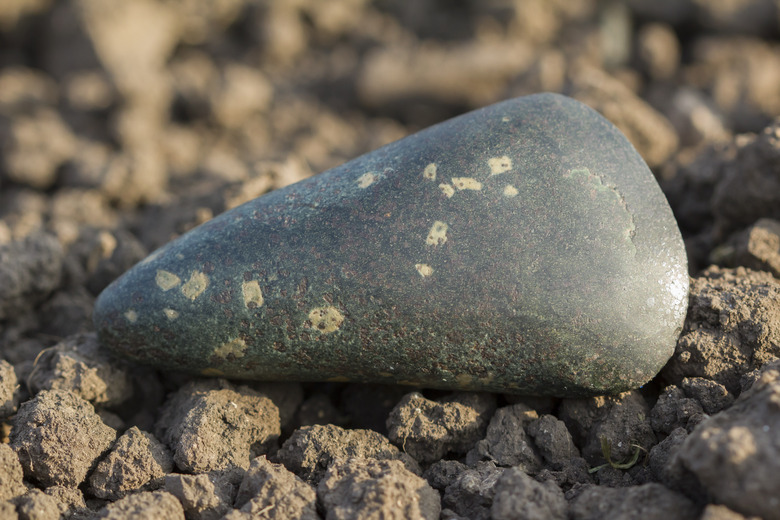List Of Neolithic Stone Tools
The Neolithic Age was approximately 10,000 to 3,000 years ago. It was the beginning of the end of the Stone Age and the beginning of organized agriculture and settlement. Stone tools were the norm, but began to be more sophisticated, specialized, and were often polished to a fine finish. Rocks with a high percentage of silicium dioxide (SiO2) were best suited for tools, as a sharp blow causes pieces to "flake" off, leaving sharp edges. Before the Neolithic, humans made use of "hand axes," roughly-hewn chopping, scraping and cutting tools with a bulbous, hand-sized stone grip that tapered down to a sharp point. By the time the Neolithic came around, hand axes had fallen out of favor as they were more difficult and less specialized than the new tools humans developed. Regardless, scientists consider the creation of all these tools a sign of early human ingenuity.
Scrapers
Scrapers
Scrapers are one of the original stone tools, found everywhere where people settled, long before the Neolithic Age began. Scrapers were used both to butcher animals, and then to remove meat from the hides. The hides could then be cured as leather. A scraper is a flat piece of stone with one longer slightly curved edge. The edge is sharpened by "knapping," or banging off flakes with another rock.
Blades
Blades
While a scraper can be used for cutting into an animal, a longer, thinner blade can be inserted deeper into a carcass, or run along a bone, and works better for the fruits and vegetables of a settled agricultural life. Blades are more difficult to make than scrapers; when knapping down to a thin piece of rock, it is easy to snap the piece in two.
Arrows and Spearheads
Arrows and Spearheads
Arrows and spearheads are a more sophisticated shape than simple scrapers and blades. Not only is the tip more delicate, but to shape the end of the head to slip into the shaft, and also provide protrusions that could be used to tie the point in place, required a new degree of precision and care.
Axes
Axes
The polished stone ax is considered one of the most important developments of the Neolithic era. Once the ax was shaped through flaking, another stone was used to grind it smooth. Axes make the clearing of land much simpler, allowing the spread of agriculture. Axes also make effective weapons, and it is thought that many Neolithic axes were meant to be used on enemies rather than trees. The need for self-protection led to a more centralized village life within high walls.
Adzes
Adzes
The adze is a woodworking tool. It is a flat blade attached to a handle, somewhat like an ax, except that the blade is turned horizontally, somewhat like a hoe. When it strikes a piece of wood it gouges out a chip. It was and is still used in cultures that make dugout canoes, as it is one of the fastest ways to hollow out a log. A larger adze also makes an effective tool for digging, removing roots and generally preparing land for planting.
Hammers and Chisels
Hammers and Chisels
Chisels were made by attaching a sharp piece of stone to the end of a sturdy stick. Hammers were made by rounding a rock, and either drilling a hole through it or creating a notch around the outside that could be used when securing the head to a handle by rope or sinew. Hammers were mostly used with chisels in woodworking, though the difference between a hammer and a war club is really only in the use.
Cite This Article
MLA
Waugh, Rick. "List Of Neolithic Stone Tools" sciencing.com, https://www.sciencing.com/list-neolithic-stone-tools-8252604/. 23 April 2018.
APA
Waugh, Rick. (2018, April 23). List Of Neolithic Stone Tools. sciencing.com. Retrieved from https://www.sciencing.com/list-neolithic-stone-tools-8252604/
Chicago
Waugh, Rick. List Of Neolithic Stone Tools last modified March 24, 2022. https://www.sciencing.com/list-neolithic-stone-tools-8252604/
